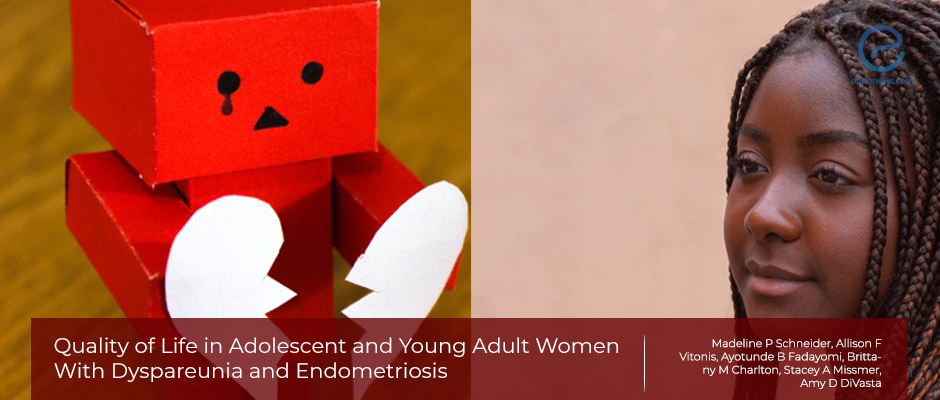The Impact of Painful Sex on the Physical and Mental Wellbeing of Adolescent and Young Adult Women
Aug 14, 2020
Painful intercourse, a common symptom of endometriosis, can impair the physical and mental wellbeing of adolescent and young women with endometriosis.
Key Points
Highlights:
- Painful intercourse has a negative impact on the physical and mental wellbeing of adolescents and young adults.
- This impact is stronger in adolescents and young adults with endometriosis compared to those without the disease.
Importance:
- Adolescents and young adult women should be informed about painful sex may be related to endometriosis.
What's done here:
- Researchers analyzed the answers of 438 women ages 18 to 25 who participated in the “Women's Health Study: From Adolescence to Adulthood” and have had sexual intercourse
Key results:
- Adolescent and young adult women with endometriosis experienced painful intercourse twice as often as those without endometriosis (79% vs. 40%).
- All short form-36 subscale scores were significantly lower in adolescent and young adult women who experienced painful sexual intercourse compared to those who did not, regardless of whether or not they had endometriosis.
- The negative impact was significantly stronger for six sub-scales in adolescents and young adult women with endometriosis compared to those without.
- Mean scores were all less than the normative score in adolescents and young adult women with endometriosis, indicating impairment.
Limitations:
- There may be a selection bias in this study as it required the laparoscopic diagnosis of endometriosis and these patients likely have more severe disease. Painful sexual intercourse may, therefore, be particularly high in this group.
- There were no questions in the survey about the frequency of sexual intercourse. Some of the adolescents and young women may have reported having had painful sexual intercourse whereas this could have been discomfort caused by first sexual intercourse and may be different from recurrent pain with intercourse.
Lay Summary
Clinicians should ask adolescents and young women about painful sex, not just talk about contraception and the prevention of sexually transmitted diseases. This is because painful sexual intercourse could have a negative impact on relationships and peer engagement, which is very important for the formation of identity during adolescence.
According to a study published in the Journal of Adolescent Health, painful sexual intercourse impacts adolescents and young adult women both with and without endometriosis. This has a negative effect on both the physical and mental health of women. However, the effect is stronger in women with endometriosis compared to those without.
The authors of the study analyzed 438 women, ages 18 to 25 who participated in a study called: “Women's Health Study: From Adolescence to Adulthood” and reported having had sexual intercourse. Of these, 151 had a surgical diagnosis of endometriosis while 287 had no known endometriosis. Participants completed a questionnaire that included the short form-36 (SF-36) quality of life survey. Lower scores on this survey indicate impairment.
The results showed that women with endometriosis experienced painful sexual intercourse twice as often as those without the disease. When the researchers looked at the answers of women who said they’ve had painful sex, i.e. responded “yes” to the question: “Have you had pain during/within 24 hours following sexual intercourse”, all subscale scores in the SF-36 were lower compared to women who did not experience pain during or after sex. Of these, six subscale scores were significantly lower in participants with endometriosis compared to those without.
The researchers found that more than 75% of adolescents and young adults with endometriosis and around 66% of those without endometriosis experienced painful sexual intercourse. This had an impact on their physical and mental health quality of life scores, with the impact being stronger in adolescents and young women with endometriosis compared to those without.
The authors concluded that assessing painful intercourse should be an important part of reproductive healthcare. This way, they said, the social functioning, mental health, and physical wellbeing of young adult women can be optimized.
Research Source: https://pubmed.ncbi.nlm.nih.gov/32291152/?from_term=endometriosis&from_sort=date&from_size=100&from_pos=41
Painful intercourse quality of life adolescents physical and mental wellbeing

